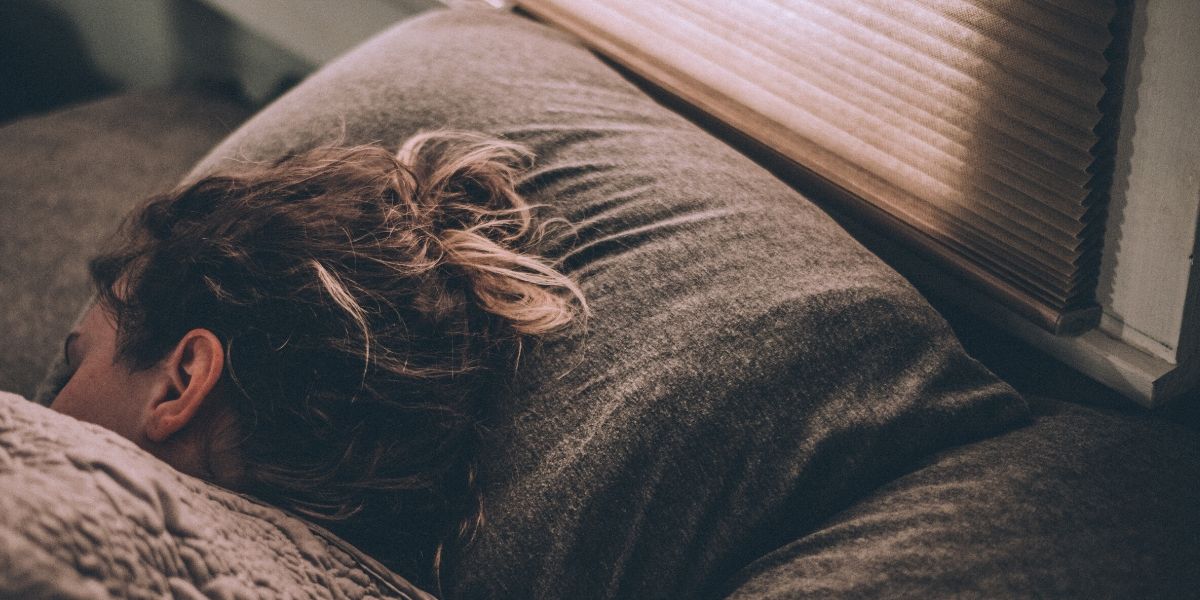You’ve been sleeping by yourself for six months! Your usual bed partner is in fact refusing to share the same bed, because you’re snoring too loud and you often stop breathing for several seconds… and because you refuse to consult…
With good reason, you did a little research: sleep apnea can mean having to use machines that make you sound like Darth Vader when you breathe. Scary, right?
So to avoid this extreme solution, you looked up “what is the best pillow against sleep apnea?” on Google, and you happened upon our guide. Just relax and keep on reading, you’re in good hands!
What is sleep apnea?
Before going to the doctor, you think Google might be able to help you. That’s why you are looking up explanations about sleep apnea!
In short, sleep apnea can be summarized as interruptions in your breathing when you sleep. These can last from 10 to 60 seconds on average, and occur several times an hour.
The result: less oxygen in your body, and more carbon dioxide. Your heart then has to work harder to counter this, and in addition, this condition also triggers repeated awakenings during your sleep. Individuals who suffer from obesity as well as seniors, smokers and people who drink alcohol are among the people who are more at risk of suffering from this disorder.
On top of that, if we look at secondary effects linked to sleep apnea, the degraded quality of sleep can cause somnolence (in itself potentially responsible for work or car accidents during the day). There are also long term risks: an increase in your heart rate, and even worse, increased risks of stroke. Sleep apnea is a serious thing!
How do I know if I really suffer from sleep apnea?
For once, you don’t need help from Google, but from your sleep partner! If the latter tells you that you’re snoring constantly and excessively, take note of it. To be sure, that’s the first sign that you do have sleep apnea! Why? Because snoring occurs when the muscles at the back of the throat slacken and fail to keep the airway open.
Other signs: fatigue, lack of motivation, struggling to get up in the morning, headaches upon waking, and as previously mentioned, increased somnolence. You won’t necessarily fall asleep, but you’ll find it harder to focus, even to drive. The proof of this is that sleep apnea multiplies by fifteen the risks of car accidents!
How can I reduce the effects of sleep apnea?
Non pillow-related tips
If your sleep apnea is moderate, we recommend that you change your lifestyle habits. Losing weight, exercising, avoiding alcohol and sedatives as well as following a regular sleep schedule will help you a lot. You can also try positional therapy. The latter aims to condition the person to sleep on their side so that the tongue and soft tissues don’t obstruct the airways. It’s a solution you shouldn’t overlook: several studies have clearly shown the effectiveness of positional therapy in the case of mild to moderate apnea.
If, on the contrary, your sleep apnea is more serious, you’ll need to go see your doctor, and you’ll probably have to rely on a continuous positive airway pressure device. You’ll then wear the famous “Darth Vader” mask in bed, which will provide continuous air via a machine that keeps the soft tissues as the back of the throat open, reducing in this way the episodes of apnea.
Pillows to counter sleep apnea

Among the recommended pillows, let’s start with the long pillow that occupies the whole length of the bed. This one will prevent you from sleeping on your back. Some body pillows are even specifically designed for sleeping on your side! If you need to wear a mask, CPAP pillows are an ideal choice. Hollowed on the side, they allow you to wear the mask unobstructed.
More generally, foam pillows, whether made of memory foam or not, are the most recommended. By this token, the Polysleep pillow is perfectly suited: the user can roll, fold, remove or add the foam support layers as needed, for a personalized and high level of support.
Conclusion: sleep apnea is serious, and an adapted pillow can help a lot!
Ultimately, sleep apnea can have grave consequences:
- A degradation of the quality of your sleep, leading on the short term to loss of vigilance.
- On the long term, potential negative effects on your health (higher heart rate and risk of stroke).
Several apparent symptoms can help you know if you suffer from sleep apnea:
- Constant and extreme snoring.
- Greater fatigue causing somnolence during the day.
- Lack of concentration.
But there is hope! You can improve your sleep, even while suffering from sleep apnea:
- If your sleep apnea is mild, you can change your lifestyle habits (losing weight, exercising, avoiding alcohol and sedatives, following a regular sleep schedule). Positional therapies can also be of great help.
- If your apnea is more serious, you’ll need to consult a physician. The previous tips are still valid, but you’ll probably have to start using a continuous positive airway pressure device.
Finally, no matter the degree of your sleep apnea, an adapted pillow will help a lot:
- You can choose a body pillow that allows you to sleep comfortably of the side.
- Besides that, a long pillow that takes the whole length of the bed will do!
- If you wear a continuous positive airway pressure mask, CPAP pillows will be perfect for you!
- If you don’t need so much support, foam pillows like the Polysleep pillow will suit you the best!
If you've enjoyed this blog post, don't hesitate to Share it by clicking on one of the buttons below!










